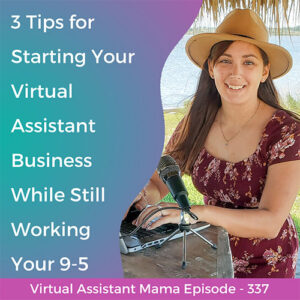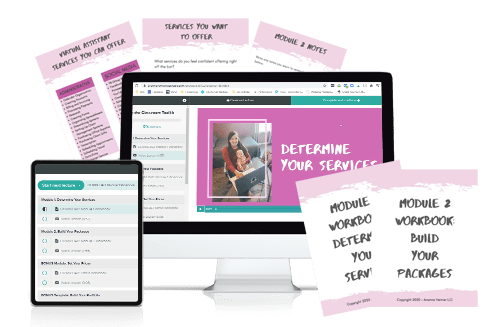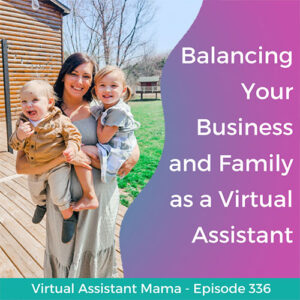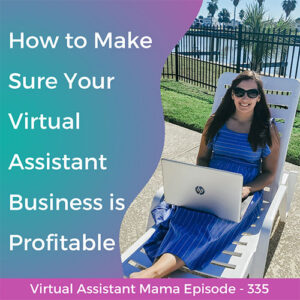
Episode 337: 3 Tips for Starting Your Virtual Assistant Business While Still Working Your 9-5
In this episode of the Virtual Assistant Mama podcast, I’m sharing 3 tips to help you start your Virtual Assistant business while still working your 9-5.
On this episode of the Ditch the Classroom podcast, we have my amazing husband Reid Vernier on to discuss how to partner with your spouse in your journey out of teaching.
Throughout the episode, Reid and I discuss his biggest fears in regards to me becoming a Virtual Assistant, what helped to remove those fears, how freelancing has benefited our family, and more. This episode is very helpful for those who want to leave teaching, but aren’t sure about how to convince their spouse that this is a good idea.
Also, don’t forget to register for the FREE Workshop – The Number 1 Way to Quit Teaching in 6 Months or Less.
Between now and January 19, you can register for the workshop by visiting ariannavernier.com/free-workshop. This workshop help you:
– get clarity on what services would light you up and make you excited to work on your business every day
– find out where to find paying clients to help you replace your teaching income quickly
– learn the 5 P’s you need in order to become a successful Virtual Assistant and start working from home with your babies faster
There will be a special gift for those who register, but registration closes on January 19, so make sure to get signed up for the FREE workshop asap!


Grab your Ditch the Classroom Toolkit for only $47!
Sign up for the free Virtual Assistant Workshop, the Ditch the Classroom Toolkit, or Teacher Turned Freelancer Academy.
Have any questions for me? Feel free to send me an email at arianna@ariannavernier.com or on Instagram @arianna.vernier! I love chatting with y’all and helping you hit the ground running. Are you ready? Let’s go.
Love,

Full Episode Transcription:
Arianna Vernier (00:00):
Hey y’all. Welcome back to the Ditch the Classroom podcast. Today’s episode I’ve got my favorite guest ever, my sweet, sweet husband, and we’re just gonna be breaking down how you can get your spouse on board with your dream to quit teaching what you wanna do and just having a whole conversation around tips for sharing your dreams with your spouse. So I’m really excited you’re gonna love today’s episode. Don’t forget to get registered for our free workshop, The Number One Way to Quit Teaching, which is taking place next Thursday, January 19th, gonna be breaking down the five Ps of becoming a virtual assistant. Cannot wait to share that with y’all. Go check it out at ariannavernier.com/free-workshop or click the link in the show notes. All right y’all, let’s jump into today’s episode.
Arianna Vernier (00:55):
Hey y’all. Like I mentioned, I’ve got my wonderful husband here on the podcast today. Before we get started, I’ll just tell you guys a little bit of our background. We met in college our freshman year. We lived in the same dorm, started dating about halfway through that first year of college and then we’ve been together 10 years, married for five and have a three year old daughter and one year old almost son. And our life is crazy and that’s how we like it. Does that all sum it up?
Reid Vernier (02:32):
That does.
Arianna Vernier (02:34):
So I’ve got Reid here on the podcast just to kind of share with you guys helping you figure out how to get your spouses on board with your ditch the classroom journey because sometimes that’s one of the hardest things to do. Like you might have that dream on your heart, but expressing it in a way that your spouse can understand can sometimes be pretty challenging. So that’s kind of what we’re gonna break down. So babe, the first question I have for you, what were your first thoughts when I told you I wanted to invest money into learning how to become a virtual assistant?
Reid Vernier (03:11):
When you first brought up this idea, I was definitely skeptical because it was something different, something that wasn’t along the normal lines of a career path and it was going completely into the unknown. So I needed to learn more about it before I was comfortable making that type of investment.
Arianna Vernier (03:29):
Yeah, I think when your spouse doesn’t know like what this even is, you can’t expect them to just give a hundred percent support.
Reid Vernier (03:38):
Right.
Arianna Vernier (03:38):
Because they wanna make sure you’re safe, they wanna make sure the family’s provided for. And so sometimes I think we can jump to conclusions like, oh, they’re not supporting me because they won’t let me do this. But maybe they just don’t have a full understanding of what you’re even trying to do. So sometimes you just kind of have to break it down and show them.
Reid Vernier (04:02):
Yep, absolutely. This is something that’s not well known to many people and it’s becoming more well known, more widely spread and it just takes a while for some individuals to understand that this is a big industry that can be profitable and is you, you make it your own as you go along.
Arianna Vernier (04:21):
Yeah. So what were some of your biggest hesitations or fears? With me starting this business,
Reid Vernier (04:29):
A lot of that had to do with us jumping into the unknown of moving from that traditional career path nine to five job and having a set employer to starting your own business and making the all the calls yourself and having to create that plan from start to finish of how we’re going to continue to pay the bills and how this would change our lives entirely.
Arianna Vernier (04:55):
Yeah, like I said, you we, the big thing is making sure our families provided for and when you leave that nine to five, like yeah, you don’t have the consistent income necessarily. Like you can’t say this is exactly how much I’m getting each month, but you also have the safety of usually having multiple clients where if you did lose one, you wouldn’t lose all of the income. And I think that was hard to see at first when you’re first like trying to get clients. It takes a little bit like a month or so to get them. So there’s that fear there of like, what if I don’t get them? So yeah, I totally understand that. But I think a lot of people’s hesitations are, yeah, the fear of the unknown and that a nine to five seems more secure. But I kind of just wanted to point out to the listeners and their spouses like it’s not necessarily more secure because if you lose that job, you lose all of your income or if you just lose like one client, you’ve still usually got other clients that you’re getting income from till you replace the one you lost.
Reid Vernier (05:59):
Yes. The idea of job security is actually backwards from what we’re taught. Originally of having a secure single employer that you’ve been with for many years. Doesn’t matter how many years you’ve been with them, they could still tomorrow decide that you’re not necessary and that’s, you know, you’d be looking for another job at that point. Whereas when you have those multiple clients you can gain some, lose some and you still will have that regular source of income from the clients that you do have.
Arianna Vernier (06:26):
Yep. So what do you think helped you the most to remove those fears you had at first
Reid Vernier (06:34):
When you did land your first client, and I saw that this is something that is real viable, something that can provide a regular source of income and also something that can be grown more than a teaching income. Whereas you have the set number that, you know, it’s given to you by some arbitrary group or a decision is made on what teachers should make. Whereas this type of building a client base can provide way more than that in the long run.
Arianna Vernier (07:05):
Yeah, and I think something that helped too was that we communicated a lot like all of my goals, we kind of established my goals together and set timelines for them and yeah, some of them didn’t get hit and we didn’t like freak out about it, but it helped you to know what I was working towards for our family I think. And it helped me to have him not like pushing me, like hounding down my back but like knowing that he believed that I could hit that goal helped me hit it. I think sometimes, at least myself, and I think a lot of women do this, we think that our husbands can read our mind and just know what we’re trying to do and what we’re trying to work towards, but sometimes they just don’t see it the same. And so if we have to just kind of show them and, and I think break it down into what this can do from for our family, what this would change and try to keep it positive. Don’t just be like, you don’t believe in me, I’m trying to do this for our family. Like that’s not gonna help but just kind of show them like, yes, I know this is scary, I am scared too. This is what I’m trying to get and allow our family to do.
Reid Vernier (08:19):
I personally am more of a visual and numbers type of person and I want to see it written down, you know, what the possibilities are, what the possible risks are involved and really the overall goal of what we’re trying to achieve by executing this plan and how it will potentially impact our lives for the better, what it will allow us to do. So outside of just the numbers, how much freedom is it going to give you and your family to try new things and do stuff that you wouldn’t normally be able to do when you have to work around two job schedules.
Arianna Vernier (08:54):
Yeah, that was a, a big thing that gave us a lot more flexibility and I think we did it a little bit backwards where I had already pretty much quit teaching when I started this. But remember too, if you’re still teaching, you can start this as a side hustle and just have that conversation with your husband. Like where can you help me with our family tasks and stuff so that I can have, you know, five hours a week to start building this as a side hustle so that I can replace my teaching income And we don’t have to just like completely let go of my teaching income from the get-go. I can build this till we get to a comfortable point where I can leave. So remember that too. And then yeah, show your husband, you know, if these are my prices that I wanna charge, this is how many clients I would need to replace that income and that’ll help ’em see more of the visual of it too, like Reid was saying.
Reid Vernier (09:47):
Yeah, I really like that exercise of building it backwards, putting down the number that you would like to make or that you need to make to support part of the family expenses and then building it back from you know, each individual task and what clients you have to get, how many and what prices you need to charge in order to reach that goal.
Arianna Vernier (10:06):
Yeah. And if you need 10 million clients then you need to charge more because you’re not charging enough. So how do you think my virtual assistant business has benefited our family?
Reid Vernier (10:17):
Oh, there’s lots of ways, but some of the biggest ones include the time that we have now. Like I said previously, we don’t have to plan around two schedules to do vacations or just the weekly planning of, you know, taking kids to daycare and such. The timing is a little bit easier for that and then since you replaced your teaching income and you continue to do that, that’s given us more freedom to make better decisions about our individual career paths as well as together what we want to accomplish as a family
Arianna Vernier (10:49):
And investing and –
Reid Vernier (10:51):
Yep. It’s also inspired me to, you know, try to get more clients and work on my own side of things as well.
Arianna Vernier (10:57):
Yeah. Yep. Cause we’re starting his business now too, so that’s fun. So what would be kind of your suggestion, or what would you say to spouses who are nervous about their wife ditching the classroom?
Reid Vernier (11:12):
Well overall, the teaching industry isn’t the best industry to be in for starters. We all know the struggles that teachers face and teachers have a lot of skills that can be better utilized outside of the classroom and better appreciated outside of the classroom. So that can be something that can really add to your wife’s overall career aspirations and just feeling about herself in general really can help improve the overall path that she wants to take with her career. So I’d say that is really something that can benefit her and if this is something that’s been put on her mind to start this journey, that’s something there’s a, there’s a reason for that.
Arianna Vernier (11:55):
Yeah. Yeah. And I think as spouses, it’s our job to support each other and yes, that doesn’t mean you have to 100% agree all the time. You can still question things, but it, like you said, if she’s got that dream on her heart, God place it there for a reason, how can we figure this out to make it work for our family and still be able to achieve all of our goals we wanna hit?
Reid Vernier (12:18):
Right. And going back to the communication side of things, if there’s something that you’re wanting to see or wanting to know about the opportunity, then just, you know, ask about that. Ask what types of prices they’re going to charge for their services, what types of clients they’re going to get and how many they think they’ll be able to balance with the daily life, everything that’s asking of our time on a daily basis. And ask as many questions as you can to better understand what this new venture would look like for your family.
Arianna Vernier (12:50):
Yeah. And also don’t forget, you guys, we’ve got our free workshop coming up next week, January 19th, where I’m gonna be breaking down what it takes to become a virtual assistant and the five Ps you need to be a successful virtual assistant. So show that to your husbands. If they don’t wanna watch the whole workshop, it’s not that long, but if they don’t wanna watch the whole thing, shoot me an email and I’ll send you guys the slides so you can look through it and talk through it together. That might be helpful too, to kind of show them what’s possible in the workshop as well. So babe, what would you say is kind of your number one tip for how women can get their spouses on board with ditching the classroom?
Reid Vernier (13:33):
My number one tip for getting your spouse on board with quitting teaching is to write down what you hope your life will be like in the future. And write down as much detail as you can about what this change will allow you and your family to accomplish and what possibilities are out there that you wouldn’t normally get as a part of teaching.
Arianna Vernier (13:57):
Yeah, I agree. And I think to take that one step further, set those goals together. Like I said, if you’re building this as a side hustle, figure out how much time you’re gonna be able to, to dedicate this and how your spouse is gonna be able to help you do that. And then what those goals are that you’re trying to hit and set those dates. And like I said, if you don’t hit those goals by that exact date, that’s okay. But just having that game plan I think really can help your spouse get on board instead of just like being like, okay, I’m just gonna let you fly by the seat of your pants and I have no idea what go, what’s going on.
Reid Vernier (14:33):
Right.
Arianna Vernier (14:33):
Awesome. Well I think this is a good conversation and I think it’ll help the listeners a lot. If you guys have any questions, you can always message me and if it’s a question for Reid, I’ll get his feedback and then let you know. But yeah, I appreciate you coming on today, babe.
Reid Vernier (14:53):
Thanks for inviting me.
Arianna Vernier (14:54):
Yeah. All right, y’all make sure you get registered for our free workshop. Like I said, that’s next Thursday, January 19th, and you can get registered for that at ariannavernier.com/free-workshop or find the link in the show notes. All right, y’all, I love you so much and we’ll see you next time.

In this episode of the Virtual Assistant Mama podcast, I’m sharing 3 tips to help you start your Virtual Assistant business while still working your 9-5.

In this episode of the Virtual Assistant Mama podcast, I’m sharing how to balance your business and family life as a Virtual Assistant.

In this episode of the Virtual Assistant Mama podcast, I’m sharing how to make sure your Virtual Assistant business is profitable.